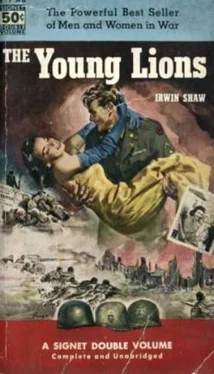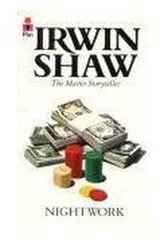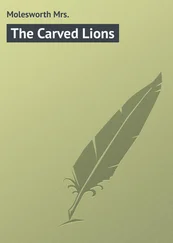Irwin Shaw - The Young Lions
Здесь есть возможность читать онлайн «Irwin Shaw - The Young Lions» весь текст электронной книги совершенно бесплатно (целиком полную версию без сокращений). В некоторых случаях можно слушать аудио, скачать через торрент в формате fb2 и присутствует краткое содержание. Жанр: Классическая проза, на английском языке. Описание произведения, (предисловие) а так же отзывы посетителей доступны на портале библиотеки ЛибКат.
- Название:The Young Lions
- Автор:
- Жанр:
- Год:неизвестен
- ISBN:нет данных
- Рейтинг книги:4 / 5. Голосов: 1
-
Избранное:Добавить в избранное
- Отзывы:
-
Ваша оценка:
- 80
- 1
- 2
- 3
- 4
- 5
The Young Lions: краткое содержание, описание и аннотация
Предлагаем к чтению аннотацию, описание, краткое содержание или предисловие (зависит от того, что написал сам автор книги «The Young Lions»). Если вы не нашли необходимую информацию о книге — напишите в комментариях, мы постараемся отыскать её.
The Young Lions — читать онлайн бесплатно полную книгу (весь текст) целиком
Ниже представлен текст книги, разбитый по страницам. Система сохранения места последней прочитанной страницы, позволяет с удобством читать онлайн бесплатно книгу «The Young Lions», без необходимости каждый раз заново искать на чём Вы остановились. Поставьте закладку, и сможете в любой момент перейти на страницу, на которой закончили чтение.
Интервал:
Закладка:
There were steps behind him, clear and ringing on the cobblestones. Christian turned with the bouquet in his hand. He felt a glancing blow, light but sharp, on his fingers, and the flowers went spinning out of his grasp and scattered on the dirty stones at his feet.
An old Frenchman in a black suit and a greenish felt hat was standing there, a cane in his hand. The old man had a sharp, fierce face and a military ribbon in his lapel. He was glaring furiously at Christian.
"Did you do that?" Christian asked the old man.
"I do not talk to Germans," the old man said. The way he stood made Christian feel that he was an old, retired regular soldier, used to authority. His leathery face, wrinkled and weathered, added to the impression. The old man turned on the girls.
"Sluts!" he said. "Why don't you just lie down? Lift your skirts and be done with it!"
"Ah," the dark girl said sullenly, "be quiet, Captain; this is not your war."
Christian felt foolish standing there, but he didn't know what to do or say. This was not exactly a military situation, and he certainly couldn't use force on a seventy-year-old man.
"Frenchwomen!" The old man spat. "Flowers for Germans! They've been out killing your brothers and you present them with bouquets!"
"They're just soldiers," the girl said. "They're far away from home and they're so young and handsome in their uniforms." She was smiling impudently at Brandt and Christian by now, and Christian couldn't help laughing at her direct womanly reasoning.
"All right," he said, "old man. We no longer have the flowers. Go back to your drink." He put his arm in a friendly manner across the old man's shoulders. The old man shook the arm off violently.
"Keep your hands off me!" he shouted. "Boche!"
He strode across the square, his heels clicking fiercely on the cobbles. "Ooo, la, la," Christian's driver said, shaking his head reprovingly as the old man passed the car.
The old man paid no attention to him. "Frenchmen! Frenchwomen!" he shouted to the town at large as he stalked towards the cafe. "It's no wonder the Boche are here this time! No heart, no courage. One shot and they are running through the woods like rabbits. One smile and they are in bed for the whole German Army! They don't work, they don't pray, they don't fight, all they know how to do is surrender. Surrender in the line, surrender in the bedroom. For twenty years France has been practising for this and now they have perfected it!"
"Ooo, la, la," said Christian's driver, who understood French. He bent over and picked up a stone and casually threw it across the square at the Frenchman. It missed him, but it went through the window of the cafe behind him. There was the sharp crash of the plate-glass and then silence in the square. The old Frenchman didn't even look round at the damage. He sat down silently, leaning on the head of his cane. Ferociously and heartbrokenly he glared across at the Germans.
Christian walked over to the driver. "What did you do that for?" he asked quietly.
"He was making too much noise," the driver said. He was a big, ugly, insolent man, like a Berlin taxi-driver, and Christian disliked him intensely. "Teach them some respect for the German Army."
"Don't ever do anything like that again," Christian said harshly. "Understand?"
The driver stood a little straighter, but he didn't answer. He merely stared dully and ambiguously, with a lurking hint of insolence, into Christian's eyes.
Christian turned from him. "All right," he called. "On the road."
The girls were subdued now, and didn't wave as the cars lurched across the square and on to the road towards Paris.
Christian was disappointed when he drove up to the brown sculptured bulk of the Porte Saint Denis and saw the open square around it thronged with armoured vehicles and grey uniforms, the men lounging on the concrete and eating from a field kitchen, for all the world like a Bavarian garrison town on a national holiday, preparing for a parade. Christian had never been in Paris, and he felt it would have been a marvellous climax to the war to be the first to drive through the historic streets, leading the Army into the ancient capital of the enemy.
He drove slowly through the lounging troops and the stacked rifles to the base of the monument. He signalled to Himmler in the car behind him to stop. This was the rendezvous point at which he had been ordered to wait for the rest of the company. Christian took his helmet off and stretched in his seat, taking a deep breath. The mission was finished.
Brandt leaped out of the car and busied himself taking pictures of troops eating, leaning against the base of the monument. Even with his uniform and the black leather holster strapped around his waist, Brandt still looked like a bank-clerk on vacation, taking snapshots for the family album. Brandt had his own theories about pictures. He picked out the handsomest and youngest soldiers. He made a point of picking very blond boys most of the time, privates and lower-grade non-commissioned officers. "My function," he had once told Christian, "is to make the war attractive to the people at home." He seemed to be having success with his theories, because he was up for a commission, and he was constantly receiving commendations from propaganda headquarters in Berlin for his work.
There were two small children wandering shyly among the soldiers, the sole representatives of the French civilian population of Paris in the streets that afternoon. Brandt led them over to where Christian was cleaning his gun on the hood of the little scout car.
"Here," Brandt said, "do me a favour. Pose with these two."
"Get someone else," Christian protested. "I'm no actor."
"I want to make you famous," Brandt said. "Lean over and offer them some sweets."
"I haven't any sweets," Christian said. The two children, a boy and a girl who could not have been over five years old, stood at the wheel of the car, looking gravely up at Christian, with sad, deep, black eyes.
"Here." Brandt took some chocolate out of his pocket and gave it to Christian. "The good soldier is prepared for everything."
Christian sighed and put down the dismantled barrel of the machine-pistol. He leaned over the two shabby, pretty children.
"Excellent types," Brandt said, squatting, with the camera up to his eyes. "The youth of France, pretty, undernourished, sad, trusting. The good-natured, hearty, generous German sergeant, athletic, friendly, handsome, photogenic…"
"Get away from here," Christian said.
"Keep smiling, Beauty." Brandt was busily snapping a series of angles. "And don't give it to them until I tell you. Just hold it out and make them reach for it."
"I would like you to remember, Soldier," Christian said, grinning down at the sombre, unsmiling faces below him, "that I am still your superior officer."
"Art," said Brandt, "above everything. I wish you were blond. You're a good model for a German soldier, except for the hair. You look as though you once had a thought in your head and that's hard to find."
"I think," said Christian, "I ought to report you for statements detrimental to the honour of the German Army."
"The artist," said Brandt, "is above these petty considerations."
He finished his pictures, working very fast, and said, "All right." Christian gave the chocolate to the children, who didn't say anything. They merely looked up at him solemnly and tucked the chocolate in their pockets and wandered off hand-in-hand among the steel treads and the boots and rifle butts.
An armoured car, followed by three scout cars, came into the square and moved slowly alongside Christian's detachment. Christian felt a slight twinge of sorrow when he saw it was the Lieutenant. His independent command was over. He saluted and the Lieutenant saluted back. The Lieutenant had one of the smartest salutes in military history. You heard the rattle of swords and the jangle of spurs down the ages to the campaigns of Achilles and Ajax, when he brought his arm up. Even now, after the long ride from Germany, the Lieutenant looked shiny and impeccable. Christian disliked the Lieutenant and felt uncomfortable before that rigid perfection. The Lieutenant was very young, twenty-three or four, but when he looked around him with his cold, light-grey, imperious stare, a whole world of bumbling, inaccurate civilians seemed to be revealed to his merciless observation. There were very few men who had ever made Christian feel inefficient, but the Lieutenant was one of them. As he stood at attention, watching the Lieutenant climb crisply down from the armoured car, Christian hastily rehearsed his report, and felt all over again the inadequacy and sense of guilt and neglect of duty that he had felt walking through the forest into the trap.
Читать дальшеИнтервал:
Закладка:
Похожие книги на «The Young Lions»
Представляем Вашему вниманию похожие книги на «The Young Lions» списком для выбора. Мы отобрали схожую по названию и смыслу литературу в надежде предоставить читателям больше вариантов отыскать новые, интересные, ещё непрочитанные произведения.
Обсуждение, отзывы о книге «The Young Lions» и просто собственные мнения читателей. Оставьте ваши комментарии, напишите, что Вы думаете о произведении, его смысле или главных героях. Укажите что конкретно понравилось, а что нет, и почему Вы так считаете.











